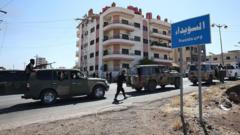As airstrikes escalate, Ukraine seeks diplomatic avenues to halt conflict and aims for a ceasefire.
**Ukraine Proposes New Peace Talks Amid Intensified Bombardments**

**Ukraine Proposes New Peace Talks Amid Intensified Bombardments**
Ukrainian President Volodymyr Zelensky urges for renewed negotiations with Russia in response to increasing attacks.
In a significant announcement, Ukrainian President Volodymyr Zelensky has proposed a new round of peace talks with Russia, seeking to revive discussions that stalled last month. During his evening address, Zelensky expressed hope for a ceasefire, revealing that senior security official Rustem Umerov has invited the Russian delegation to meet next week. He emphasized the necessity of a summit at the leadership level, suggesting that face-to-face negotiations between him and Russian President Vladimir Putin could be pivotal in ensuring lasting peace.
This proposal follows a recent wave of airstrikes in Ukraine, during which three individuals lost their lives. Zelensky reported substantial bombardments across ten Ukrainian regions, including major cities, citing the use of over 340 explosive and dummy drones as well as 35 cruise and ballistic missiles, although many were intercepted by Ukrainian defenses.
Adding complexity to the situation, former US President Donald Trump announced this week that the US would deliver advanced weaponry to Ukraine through NATO allies. He also threatened Russia with substantial tariffs if an agreement with Ukraine is not achieved within 50 days, warning of 100% secondary tariffs against Russia's trade partners if peace talks do not progress in that timeframe.
Despite earlier negotiations in Istanbul leading to some prisoner exchanges and arrangements for returning deceased soldiers, they failed to yield substantial progress, particularly concerning Ukraine's demand for an unconditional ceasefire. Following the last talks in June, Zelensky criticized Russia for its refusal to meet this demand and described Moscow's tactics as designed to render future meetings unproductive.
Since Russia's full-scale invasion began in February 2022, the Kremlin has controlled approximately 20% of Ukrainian territory, including Crimea, which was annexed in 2014. As Ukraine grapples with these ongoing challenges, its commitment to seeking diplomatic solutions remains steadfast.
This proposal follows a recent wave of airstrikes in Ukraine, during which three individuals lost their lives. Zelensky reported substantial bombardments across ten Ukrainian regions, including major cities, citing the use of over 340 explosive and dummy drones as well as 35 cruise and ballistic missiles, although many were intercepted by Ukrainian defenses.
Adding complexity to the situation, former US President Donald Trump announced this week that the US would deliver advanced weaponry to Ukraine through NATO allies. He also threatened Russia with substantial tariffs if an agreement with Ukraine is not achieved within 50 days, warning of 100% secondary tariffs against Russia's trade partners if peace talks do not progress in that timeframe.
Despite earlier negotiations in Istanbul leading to some prisoner exchanges and arrangements for returning deceased soldiers, they failed to yield substantial progress, particularly concerning Ukraine's demand for an unconditional ceasefire. Following the last talks in June, Zelensky criticized Russia for its refusal to meet this demand and described Moscow's tactics as designed to render future meetings unproductive.
Since Russia's full-scale invasion began in February 2022, the Kremlin has controlled approximately 20% of Ukrainian territory, including Crimea, which was annexed in 2014. As Ukraine grapples with these ongoing challenges, its commitment to seeking diplomatic solutions remains steadfast.





















